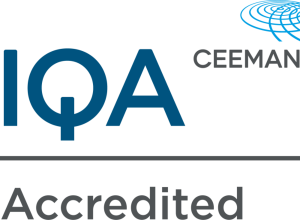Sustainability Analytics and Audit
Undergraduate (Bachelor)
Sustainability Analytics and Audit
Why choose this field of study?

Sustainability is now one of the most important trends shaping modern business, where the strategy of action is determined by specific solutions in environmental, social aspects and corporate governance standards – referred to as ESG (Environmental, Social and Governance). According to an EU directive, the largest companies are already obliged to report on sustainability (non-financial ESG reports) from 2024, and in the long term this requirement will be extended to other types of companies. This, in turn, opens up a huge demand for experts in this field – both in the sphere of planning and implementation of elements influencing business sustainability, as well as the reporting, analysis and auditing of ESG activities undertaken in specific companies and institutions.
Do you want to gain modern business knowledge in this area and join the ranks of the most sought-after specialists on the job market? Choose to study Sustainability Analytics and Audit at the VIZJA University and stay one step ahead of the competition! In this practical-profile study programme, we have combined the necessary factual knowledge of economics, finance and accounting, management and ecology, environmental protection and climate protection with the teaching of skills and competences that are key to the implementation of this knowledge into concrete actions and business processes. With us, you will learn how to create and use various types of sustainability solutions and tools that influence the building of a modern, effective and responsible organisation. Check yourself!
Sustainability Analytics and Audit, undergraduate studies – what sets us apart?
- You will gain a thorough understanding of business sustainability strategy and learn how to put ESG solutions into practice.
- You will learn about modern tools, including IT, used in business analytics.
- You will learn to work using the project method – a key skill for your future profession.
- You will learn about international sustainability reporting standards, as well as tools for their analysis and verification.
- You will learn from top professionals – including practitioners and experts from the business world – and gain first-hand experience during work placements.
- You will develop in an international academic environment (we are at the top in the Internationalisation category according to the Perspektywy 2023 university ranking).
Sustainability Analytics and Audit – what can you do after graduation?

As a graduate of this modern, future-oriented course, you can find employment in positions related to sustainability implementation and auditing. Many companies and institutions from various sectors are looking for people with a degree in the field for positions such as ESG project coordinator, CSR/ESG specialist, ESG support specialist, sustainability specialist or ESG audit expert. The practical knowledge you gain during your studies will be invaluable if you want to develop your own business that stands out in the market with a modern business strategy. After these studies, you can also start a career in the booming ESG consulting industry.
This program
is for you if:
You are interested in modern business that meets environmental and social objectives.
You want to gain knowledge and competence in the area of sustainability reporting and research that will give you an edge in the job market.
You have analytical skills that you want to develop into a valuable professional qualification.



Admission rules and regulations
Note: important information for 2025 candidates
Please read carefully the application procedures in line with the changes introduced by the Polish Ministry of Science and Higher Education in 2025.
Programme and structure of studies
UNDERGRADUATE STUDIES
(BACHELOR’S DEGREE)
The bachelor (BA) degree programme in Sustainability Analytics and Audit at VIZJA University focuses on providing students with specialised knowledge in finance and accounting, economics, management and related social science disciplines. It also allows students to develop practical skills in reporting, analysis and auditing of ESG factors, as well as their implementation in corporate development strategies.
FIRST YEAR OF STUDY
In the first year, students learn about the general subjects and the first directional subjects, which are necessary for understanding the specific topics covered in the further course of study.
SEMESTER I
| Subject name | Cummulative amount of ECTS points | Cummulative amount of hours (FT/PT) |
|---|---|---|
| Health and Safety | 0 | 8/8 |
| Academic Skills | 1 | 15/8 |
| Introduction to Philosophy | 5 | 35/20 |
| Fundamentals of Social Communication | 4 | 30/16 |
| Introduction to Psychology / Introduction to the Study of State and Law (Elective) | 5 | 30/24 |
| Fundamentals of Economics | 5 | 30/24 |
| Organisation and Management Theory | 5 | 30/24 |
| Fundamentals of Auditing | 5 | 45/24 |
SEMESTER II
| Subject name | Cummulative amount of ECTS points | Cummulative amount of hours (FT/PT) |
|---|---|---|
| Sports and Recreation | 0 | 30/0 |
| Foreign Language (I) | 2 | 30/16 |
| Foundations of Spreadsheets | 1 | 15/8 |
| Project Management | 3 | 30/16 |
| Fundamentals of Accounting | 3 | 30/40 |
| Descriptive Statistics | 4 | 60/32 |
| Fundamentals of Ecology | 4 | 30/24 |
| Corporate Financial Analysis | 6 | 60/40 |
| Sustainable Development Methods and Concepts | 2 | 30/24 |
| Sharing Economics / Social Economics (Elective) | 3 | 30/16 |
SECOND YEAR OF STUDY
In the second year of training, students deepen their specialist knowledge and practical skills in further subject areas – including microeconomics, risk management, ESG regulation and sustainability reporting.
SEMESTER III
| Subject name | Cummulative amount of ECTS points | Cummulative amount of hours (FT/PT) |
|---|---|---|
| Foreign Language (II) | 2 | 30/16 |
| Sports and Recreation | 0 | 30/0 |
| Corporate Finance | 7 | 60/40 |
| Environmental and Natural Resource Economics | 4 | 45/24 |
| Microeconomics | 6 | 60/40 |
| Theoretical Foundations of an Institutional Approach / Impact Assessment - Stakeholder Theory (Elective) | 3 | 30/16 |
| Sustainability, Environmental and Climate Protection Regulations | 3 | 45/16 |
| Social Capital and Diversity Management | 3 | 30/24 |
| Corporate Social Responsibility | 2 | 30/16 |
SEMESTER IV
| Subject name | Cummulative amount of ECTS points | Cummulative amount of hours (FT/PT) |
|---|---|---|
| Foreign Language (III) | 2 | 30/16 |
| Market Analysis / Sector and Competition Analysis (Elective) | 3 | 30/16 |
| Macroeconomics | 4 | 30/24 |
| Risk Management | 3 | 30/16 |
| Sustainable Business Models / Business Intelligence (Elective) | 4 | 45/16 |
| Sustainability Reporting | 4 | 60/32 |
| Corporate Governance and Culture | 3 | 30/16 |
| Sustainability Finance | 4 | 45/24 |
| Environmental and Social Auditing | 3 | 30/16 |
THIRD YEAR OF STUDY
In the fifth and sixth semesters, students supplement their knowledge with specialised issues in the field of sustainable development, as well as completing work placements. This is also the time to prepare a community project and take the diploma exam.
SEMESTER V
| Subject name | Cummulative amount of ECTS points | Cummulative amount of hours (FT/PT) |
|---|---|---|
| Foreign Language (IV) | 3 | 30/16 |
| Operational Controlling / Analysis of Investment Projects (Elective) | 4 | 45/24 |
| IT Tools in Finance and Accounting / Information Technology in Management (Elective) | 4 | 30/16 |
| Social Marketing / Collaborative and Impact Marketing (Elective) | 2 | 30/16 |
| ESG Analysis | 2 | 30/16 |
| Project Preparation Methodology | 3 | 30/16 |
| Internship I | 14 | 360/360 |
SEMESTER VI
| Subject name | Cummulative amount of ECTS points | Cummulative amount of hours (FT/PT) |
|---|---|---|
| Valuation and Value Based Management | 3 | 30/24 |
| Energy Audit / Energy Efficiency (Elective) | 3 | 30/16 |
| Sustainable Local and Regional Development / Creating a Positive Organisational Climate (Elective) | 2 | 30/16 |
| Relational Capital Analysis / Value Chain Creation and Analysis (Elective) | 2 | 30/16 |
| Social Project | 4 | 30/24 |
| Internship II | 14 | 360/360 |
The content of the study program may change as a result of efforts to improve the quality of education and adapt the teaching offer to the current challenges of the labor market. Each change is approved by the University Senate and introduced with the aim of preparing students for their future careers in the best possible way.
Tuition fees
Fixed tuition - flexible payments
By choosing to study at VIZJA University, you can be sure that the tuition fee will not change throughout the duration of your studies. You can pay the tuition fee once for the entire year of study or spread over a semester payment. This allows you to decide how you want to plan your expenses.

Fees (academic year 2025/2026)
EU&OTHER COUNTRIES GROUP
| Year of study | Annually | Per semester* |
|---|---|---|
| I | 2900 € | 1600 € |
| II | 2900 € | 1600 € |
| III | 2900 € | 1600 € |
*Semester payment is possible from the second year of studies.
OTHER COUNTRIES
| Year of study | Annually | Per semester* |
|---|---|---|
| I | 3900 € | 2100 € |
| II | 3900 € | 2100 € |
| III | 3900 € | 2100 € |
*Semester payment is possible from the second year of studies.
EU and other countries group
This group includes citizens of the countries member states of the European Union and the following countries citizens: Azerbaijan, Belarus, Bosnia and Herzegovina, Montenegro, Georgia, Kazakhstan, Kosovo, Kyrgyzstan, Latin America, Macedonia, Moldova, Norway, Russia, Serbia, Tajikistan, Turkey, Turkmenistan, Ukraine, Uzbekistan.
Other countries
The citizens of all the remaining countries.
Study in Polish!
Do you want to study at VIZJA University in Polish? It is possible! We have prepared a special program for international students to acquire the skills necessary for active study in Polish and for academic, social and everyday life in Poland.
The Comprehensive Polish Language Program for International Students is:
- part of The VIZJA University Foundation Program, which is a comprehensive preparation for starting regular Bachelor's or Master's studies in Polish at VIZJA University
- a course aimed at two groups of international students: students with knowledge of a Slavic language (Russian, Ukrainian, Czech etc.) and students without prior knowledge of any Slavic language
- a chance for immersion in Polish society and culture, authentic experience of life in Poland and broad career prospects on the Polish labour market
More details coming soon!
Scholarships - easier than you think

While studying at VIZJA University, you can take advantage of a wide range of financial support from the state budget and European funds, as well as benefit from special discounts with VIZJA University discount program
You can submit most scholarship applications quickly and easily through your online account.
In the academic year 2023/2024, VIZJA University awarded 800 Rector’s Scholarships, ranging from PLN 400 /month to PLN 1000 /month, depending on the average or achievements. For outstanding sport, artistic or scientific achievements, the Scholarship Committee awarded scholarships of PLN 600 /month.
Detailed information on the possibility of applying for the Rector’s Scholarship is available in the dean’s system.
A sports scholarship may be awarded to a student who excels in sport achievements at least national level. In addition we also encourage our students to take part in additional support programs- eg. the National Academic Representation.
Young sportsmen can count on financial support in the amount of PLN 600 /month.
Detailed information on the possibility of applying for sports scholarship is available in the dean’s system.
A scholarship for people with disabilities may be awarded to a student who has a disability certificate, a disability degree certificate, a ZUS certifying physician’s certificate, a disability group certificate or a certificate of permanent or long-term incapacity to work on a farm.
In the 2023/2024 academic year, depending on the degree of disability, 350 scholarships for people with disabilities were awarded, ranging from PLN 1700 /month to PLN 1900 /month.
Detailed information on the possibility of applying for a scholarship for people with disabilities is available in the dean’s system.
The allowance is a form of emergency financial assistance. Any student who found himself temporarily in a difficult life situation resulting from random events beyond the student’s control can apply for it.The allowance may be granted twice in one academic year, and the allowance is not granted twice for the same random event.
In 2024, we granted 51 allowances for a total of PLN 255 000. The allowances, depending on the student’s situation, were paid in the amount of PLN 2,000 to PLN 5,000 at a time.
Detailed information on the possibility of applying for the allowance is available in the dean’s system.
2023/2024 academic year
800 Rector’s Scholarships
51 allowances
350 scholarships for people with disabilities
12 500 000 PLN was spent in 2023/2024 on scholarships
PLN 1,890,289.35 was spent in 2019/2020 on scholarships
PLN 2,911,662.50 was spent in 2020/2021 on scholarships
PLN 4,158,177.00 was spent in 2021/2022 on scholarships
PLN 7,829,950.00 was spent in 2022/2023 on scholarships
Rector’s Scholarship – highest average: 5,44





